Iran Warns Neighbors About Israeli Presence Near Its Borders
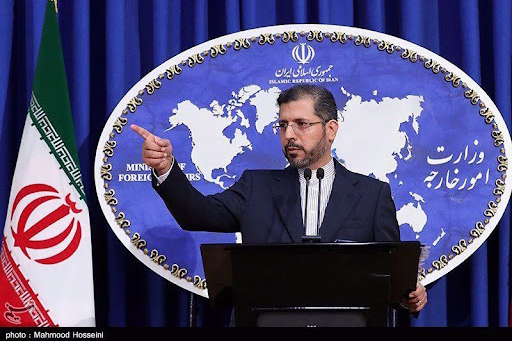
Iran will not tolerate Israel’s presence near its borders, the foreign ministry spokesman told reporters on Monday, referring to tensions with Azerbaijan.

Iran will not tolerate Israel’s presence near its borders, the foreign ministry spokesman told reporters on Monday, referring to tensions with Azerbaijan.
Saeed Kharibzadeh in his weekly briefing said Iran is serious about national security and its neighbors “are well aware of this, as we have sent them firm messages in this regard.”
Israel has close relations with the Republic of Azerbaijan and is the main weapons supplier to Iran’s northern neighbor. Tensions have risen between Baku and Tehran since September, as Azerbaijan held military drills with Turkey and Pakistan and arrested two Iranian truck drivers going to north crossing an area under its control.
Iran responded by holding its own large exercises near the Azerbaijani border and warning against the presence of Israel and what it alleged were Sunni extremists in Azerbaijan.
Military tensions also continue between Armenia and Azerbaijan over territorial issues. Iran has signaled its support for Armenia. Which was defeated in a war with Azerbaijan last year.
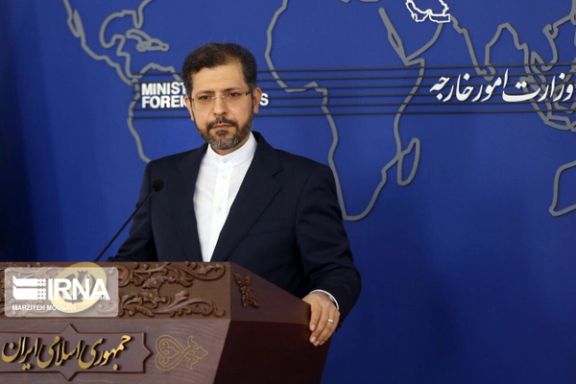
Iran's foreign ministry spokesman said Monday that talks with Saudi Arabia are now on a "more serious path", including discussion on resolving Yemen's conflict.
Saeed Khatibzadeh who was speaking at his weekly press conference said contacts have continued "uninterruptedly" between the two sides and messages have kept flowing. "The biggest focus has been on bilateral and regional issues, particularly the Persian Gulf region," he said adding that the issue of "Yemen has been part of the talks between the two sides". Efforts were being made to improve peace and stability in the Persian Gulf through better relations between Tehran and Riyadh, he said.
Iran and a Saudi Arabia-led coalition consisting mostly of Gulf Arab states support opposing sides in the Yemeni civil war since 2014. Many refer to the war in Yemen as a proxy conflict between Iran and Saudi Arabia. The war has been in a military stalemate for years, with the Iran-backed Houthis holding most northern regions of the war-ravaged country.
Khatibzadeh also told reporters that Iran is happy for the talks to continue in Baghdad and there is no need to change that.
Saudi Arabia and Iran held direct talks earlier this year brokered by Baghdad and vowed to continue the process. New president Ebrahim Raisi (Raeesi) has stressed his intention to improve relations with the Arab states in the Persian Gulf and some analysts regard this as reflected in the appointment of Amir-Abdollahian, who held responsibility for Arab affairs as deputy foreign minister (2011-16) and was ambassador to Bahrain from 2007 to 2010.
In response to a question on rumors that Lebanon had refused fuel to Amir-Abdollahian's plane during his recent visit to Beirut and that the delegation had to re-route to Damascus to take fuel before returning to Tehran, Khatibzadeh said the foreign minister's visit to Damascus had been planned ahead and Iran had not put any fuel requests to the Lebanese government.
In a tweet Sunday, Ramez Al-Kadi, a senior news reporter for Lebanon's Al Jadeed TV, claimed that Rafic Hariri International Airport had refused to supply fuel to the foreign minister's plane for fear of US sanctions and the Iranian delegation had to go to Damascus to fuel the plane. The original tweet has been removed but its screenshots are still available.
"There are some who don't want these trips to have success and make these insinuations," Khatibzadeh said
In response to another question, Iran's spokesman insisted that bases used by Iranian opposition Kurdish groups and parties in Kurdistan Autonomous Region (KAR) must be dismantled. "They can't be sources of insecurity against us, both Kurds and the Iraqi government know this."
Iranian Kurdish separatist and opposition groups have bases in northern Iraq and Tehran often says they infiltrate into its territory for operations against government targets. Iran last month used artillery and armed drones to attack targets in northern Iraq that it said were insurgent bases. Yahya Rahim-Safavi, the military adviser to Supreme Leader Ali Khamenei, warned Wednesday that Iran would not accept “any bordering country” hosting "anti-Iran terrorist groups."
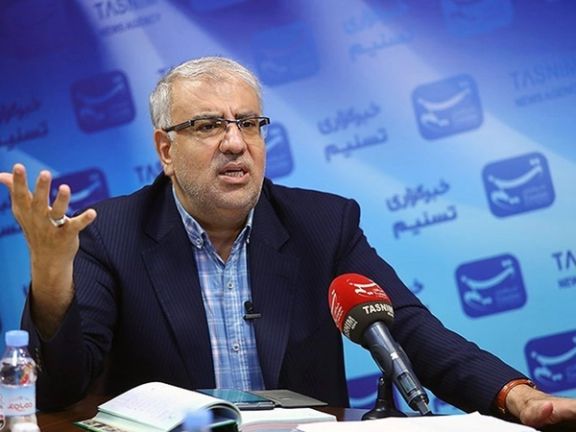
Iran is ready to swap oil with investments in the energy sector, oil minister Javad Owji told parliament on Sunday, as US sanctions prevent large-scale exports.
Owji in a meeting with parliament’s industry and mining committee promised that “good news” is on its way and Iran is ready to barter oil with merchandise and investments.
The oil ministry’s website quoted Owji as saying, "Soon, good news will be announced about the diversity of contracts for crude oil, gas condensate and oil barter."
US sanctions imposed since 2018 not only have banned third parties from buying oil from Iran but have also threatened banks with penalties if they do business with Iran. Even if a company or a country buys crude oil form Iran it would face serious hurdles in making payments through the international banking system.
It appears that China is the target of Owji’s investment marketing push. In September the oil minister said that Iran needs $145 billion in investments to improve its fossil fuel industry in the next 4-8 years and underlined the importance of making deals with Chinese companies.
China is a diplomatic ally of the Islamic Republic but so far it has avoided openly challenging US sanctions. By all indications China is clandestinely importing hundreds of thousands of barrels of crude a day via third party channels, but Iran gains little from this trade as intermediaries take most of the profits and often deliver goods instead of cash.
Owji particularly mentioned the need to make investments in its South Pars gas fields in the Persian Gulf, as production as flattened while its domestic demand has risen. Serious power cuts in the past year have crippled industrial production and angered residential customers. Officials have warned of widespread electricity shortages this winter.
Despite past attempts by Iran to lure investments from Chinese energy companies, two major players Sinopec and CNPC made a total of just $4.4 billion investments between 2007-2016. In contrast, investments in Saudi Arabia’s energy sector have reached tens of billions of dollars in the past two decades.
Former oil minister Bijan Zanganeh had said that that the crude production sector needs $20-25 billion of investments annually and if this amount does not materialize, the industry will face disruptions.
In principle, all this could change if the United States reaches a nuclear agreement with Iran and lifts sanctions. But in that case Tehran would be tempted to export its crude oil for cash to make up for depleted foreign reserves and immediate needs it faces to finance government operations with a 50 percent deficit and support its battered currency, which has fallen eightfold since 2017.
With an estimated $60 billion of annual energy, food and other subsidies and handouts to citizens and industries, Iran has failed to upgrade its oil and gas infrastructure. Given the political danger in abolishing the subsidies, it is hard to see how the country could invest tens of billion of dollars in its energy sector.
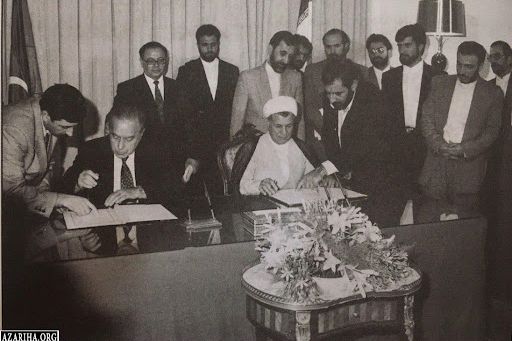
Former Azerbaijani President Haydar Aliev had suggested to Iran’s president Akbar Hashemi-Rafsanjani in 1993 to join his country to Iran, Rafsanjani’s son says.
Haydar Aliyev was father of Azerbaijan’s current president Ilham Aliyev who lately has a tense relationship with Tehran.
Mohsen Hashemi-Rafsanajani who oversees the publication of his late father's memoires, in a note in Shargh newspaper Sunday said that during a Central Asia visit by the two presidents in 1993 and at the height of the first Nagorno-Karabakh War, Aliyev urged Iran to support his country in the war against Armenia and even suggested the administration of his country by Iran.
The Iranian president doubted Aliyev's sincerity and insisted that Iran would remain neutral in the war, his son said. Aliyev's suggestion was later put to discussion at the Supreme National Security Council where the president's decision to avoid direct Iranian involvement in the war was approved.
Mohsen Hashemi-Rafsanjani has cited several entries from his father's memoires, including an entry from 23 October in which the late president said in a phone call with Aliyev he pleaded for help. "They openly say they will put the entire Azerbaijan at our disposal and are ready for the establishment of the Islamic Republic in Azerbaijan," the memoire entry says, adding: "[They say] without Iran's assistance we cannot defend [our country] and there is a possibility of Armenians reaching Baku."
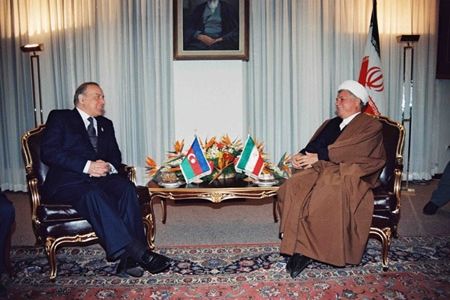
Meanwhile, Azerbaijani media are also making accusations against Iran. In a commentary by Azerbaijani journalist Bahram Batyev Saturday accused Iran of violating Azerbaijani territory and helping the Armenian side with intelligence on Azerbaijani troop movements during last year's war.
This is the first time such a claim is made, although Iran showed concern last year during the Armenia-Azerbaijan war, caught between its desire not to see any geopolitical change but feeling pressed to support Azerbaijan's effort to regain lost territories.
Calling Iran a neighbor that was smiling in Azerbaijan's face while holding a knife behind its back, Batyev claimed that on October 18, 2020 when Azerbaijani forces took over the village of Khudaferin (Khoda Afarin in Persian) and were advancing towards Zangilan, the Iranian military "shamelessly invaded" the territory of Azerbaijan and erected concrete barriers in their way, claiming that they meant to protect the Khudaferin Dam.
Baku protested to Tehran through diplomatic channels and threatened to publicly announce what Batyev called "Iran's betrayal".
The standoff between the two militaries ended a day later after the Iranian military attaché's urgent visit to the region and withdrawal of the Iranian troops "after a day of tense negotiations". Batyev said and alleged that Iran also relayed the movements of Azerbaijani forces, which they could easily see from across the border, to the Armenians.
Iran and its Supreme Leader Ali Khamenei welcomed the liberation of Azerbaijani territory in a televised speech but concerns over "geopolitical changes" in the region which could block Iran's direct transit path to Armenia were raised subtly by the media. Last week Khamenei warned about Israel's interference or military presence in Azerbaijan in another televised speech and warned Azerbaijan amid tensions over military drills in the region.
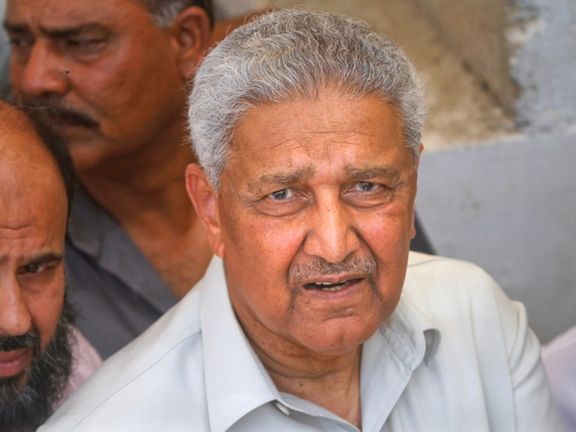
Abdul Qadeer Khan, lionized at home as the father of Pakistan’s atomic bomb despite admitting he was at the center of a nuclear proliferation ring, died on Sunday at age 85.
The nuclear scientist was admitted to hospital on August 26 after testing positive for COVID-19.
"He was loved by our nation because of his critical contribution in making us a nuclear weapon state," Pakistan's Prime Minister Imran Khan on Twitter.
But A.Q. Khan also confessed to being at the core of an operation that sold nuclear secrets to North Korea, Iran and Libya.
Analysts and United Nations officials have said his illicit network, which specialized in helping countries skirt international sanctions, created the greatest nuclear proliferation crisis of the atomic age.
After a confession on national television to his involvement in selling nuclear secrets, Khan was pardoned by then-president Pervez Musharraf. He remained under house arrest for years in his palatial Islamabad home.
In his confession, Khan said he acted alone without the knowledge of the state officials. Later he said he had been scapegoated.
Musharraf once described Khan's admission of guilt, following a tip-off from the CIA, as the most embarrassing moment of his presidency.
Pakistan never let foreign investigators question Khan, saying it had passed on all relevant information about his nuclear proliferation.
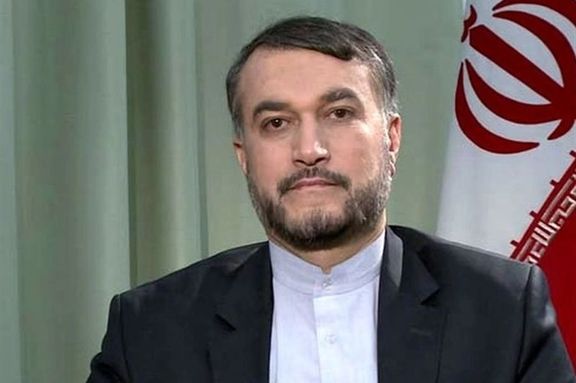
Iranian Foreign Minister Hossein Amir-Abdollahian said Sunday that relations with Asian countries should not mean ignoring relations with the West altogether.
Speaking to the Iranian Students News Agency (ISNA) after completion of his tour of Moscow, Beirut and Damascus, Amir-Abdollahian said "a balanced foreign policy" means following "active diplomacy with East and West" adding that Iran does not want to "tie the country to Russia and China" and would only follow its national interests.
As Iran has been holding talks in Vienna with the United States and its three European allies, the United Kingdom, France and Germany on reviving the 2015 nuclear agreement (JCPOA), its rhetoric of strengthening ties with China and Russia has intensified.
Amir-Abdollahian said Iran has made it clear to the European countries that following US policies and failing to honor their commitments against Iran will damage their own interests and keep them away from investment opportunities and trade with Iran. "We have told them that Iran's hand will not remain tied."
During his Moscow visit Amir Abdollahian said the government of President Ebrahim Raisi was ready to quickly expand ties with Russia. "This doesn’t mean that we’ll be dependent on China and Russia, but from a strategic point of view, we’ll use existing capacities to further the interests of both nations,” Amir Abdollahian said.
Before his confirmation by the parliament in August, Amir-Abdollahian said negotiating with the US was not a taboo and that he had three times engaged in direct talks with Americans in Baghdad.
Nevertheless, the Vienna talks to restore the JCPOA which he has pledged to continue until "all sanctions on Iran are lifted", have been in limbo since June. Iran has made repeated promises of returning to the negotiating table "soon" without setting a concrete date.
Pundits believe Iran is buying time to build more leverage before returning to the talks. On Sunday Iran's nuclear chief, Mohammad Eslami, announced that stockpiles of 20-percent enriched uranium have reached 120kg, a third more than previous estimates.
Tehran has ‘looked east’ in expanding cooperation with Russia and particularly with China to fill the vacuum left in its oil and gas projects by European companies and selling its crude oil. The new hardline president Ebrahim Raisi’s government has also invested much hope in its newly accepted full membership in the Shanghai Cooperation Organization (SCO) to boost its ailing economy.
The policy of relying on Asia or the East, particularly China and Russia, was promulgated by Supreme Leader Ali Khamenei in 2018, with the catchphrase, “Looking East”. Since then, his hardliner followers have made it one of the centerpieces of a ‘revolutionary economy’. In a speech on February 13, Khamenei reiterated that in resisting "US unilateralism," Iran should look to the east to achieve a "resistance economy" that could withstand US economic pressures.
President Ebrahim Raisi has stressed that his policy is to deepen ties with China and Russia.
His hardliner supporters, who accused the Rouhani government of giving importance only to relations with Western countries, claim China has been assisting Iran to dodge US sanctions and buying Iranian oil through back channels and not even declaring it in their customs reports.
However, close relations with China and Russia have not been the magic wand for Iran’s economy during three years of US sanctions. Overall trade is relatively small and there have been no notable investments to compensate for the absence of Western businesses.